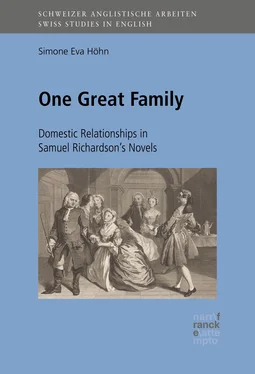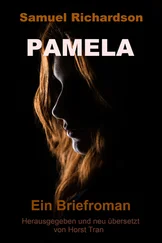This is not to deny conscious manipulation on the heroine’s part; indeed, Clarissa herself is uncomfortably aware that she is “driven to have recourse to […] artifices” in her own defence (365). My focus here, however, is not to discover the ‘true’ Clarissa or to conclude that she cannot be ‘discovered’ by the reader. Instead, I am interested in the implications which the demands of the system of duty have with regard to characters’ interiority. Whether or not Clarissa “wrote [her] heart” (176) to Anna is, in this context, less relevant than what this heart ought to feel, and how such feelings can be controlled in cases where attractive rakes or despotic fathers provide temptations to lust, anger, and other sins.2
In general, the implication of Richardson’s novels is that improper impulses can best be restrained when the individual acknowledges the system of duty but is otherwise left to his or her free agency. Both Clarissa and Grandison thematise individual processes of self-control and their results.3 In both, methods of self-restraint range from the suppression of inner conflict to its open display. However, while the constraints put on the heroine in the former lead to tragedy, Grandison shows how individual agency – whether inner struggles are hidden (Sir Charles) or exposed (Harriet) – leads to a successful connection of individual and public good. As Clarissa expresses it when criticised by Anna for sacrificing her own convenience to that of her servants: “I have my choice: who can wish for more? […] You see what free-will enables one to do; while imposition would make a light burden heavy” (1470).
Yet the exertion of her free will is constantly threatened, and this threat is very much associated with gender division. Agency is, and apparently should be, affected by sex. Despite exposing Clarissa’s arrogant brother James, for example, and despite having Clarissa protest against her brother’s assumption of paternal power, Richardson never unequivocally states that a son’s duties are as strict as a daughter’s. MulsoMulso, Hester, correspondent of Richardson evidently felt the need to argue against gender differentiation in this case. Although she had to admit that Richardson was right in so far that a daughter’s rebellion is “more fatal in its consequences” than that of a son, she insisted that their duty was not inherently different (237). Following and improving on LockeLocke, John’s arguments in Two Treatises of Government , which she has earlier quoted at some length, she insists that in relationships between parents and children, sex makes no difference:
Now the laws of God and nature are the same with regard to all conditions and ranks of people. Therefore this is a proof that nature makes no such difference between sons and daughters; and I have never heard of any divine law which imposes on daughters any duty to parents which is not equally imposed on sons. It is moreover observable, that the duty is equal to both parents; so that the mother, though a female, has as much right to the obedience of her son as the father; and this shews, that the duty arises not from any natural superiority of the parents over the children, but from those benefits they have conferred on them. (238)
The gendering of agency appears not only in resistance to power, but also in its exercise. The clearest case is that of Clarissa’s parents, where the father rules by command and authority while the mother tries to influence through persuasion and example – a division which will be taken up again, with some variation, in the parents of Sir Charles Grandison. In the conflict over her marriage to Mr. Solmes, Mr. Harlowe’s command to Clarissa: “I will be obeyed, I tell you!—and cheerfully too!—or you are no child of mine!” briefly acknowledges her interiority (65). Yet this acknowledgment takes the form of a command for suppression. Either what is demanded is merely the persuasive display of cheerfulness, and Clarissa’s real feelings are irrelevant. Or, on the other hand, the “cheerful” obedience must be real, and what has to be repressed is the process of internal struggle which precedes it.4 For Clarissa, such self-command is not possible in the case of Mr. Solmes, and although she will struggle to command her feelings, she will not fake them.
In contrast to Mr. Harlowe’s demands for “cheerful” obedience, Mrs. Harlowe offers a mediation between Clarissa’s frankness and her father’s absoluteness. She fully acknowledges Clarissa’s interiority and permits its expression – provided this remains limited to a time and space which ensures it will have no further consequences: “she was willing […] to give a child whom she had so much reason to love […] liberty to say all that was in her heart to say, that her compliance might be the freer” (94). Dwelling on the “reason” she has to love Clarissa, Mrs. Harlowe conveys a covert threat; if her daughter’s rebellious feelings find their vent in public action as well as private speech, the mother’s love may well become ‘unreasonable’. What Mrs. Harlowe offers is not support against Solmes, but an ‘unreal’, extended space for her daughter to control her inner feelings; once this self-control is achieved, it will be written out of reality, replaced, as far as regards the rest of the family, with a discussion of wedding clothes and similar matters.5 The father, demanding absolute obedience, does not need to know what thoughts have preceded it.
For Clarissa, however, this is only a fake solution for her double-bind. If she can subdue her revulsion against Solmes, she ought to have done so before (cf. e.g. 135); if, on the other hand, she cannot, then her mother’s offer is useless. As the conflict progresses, her family’s repeated threats should she disobey, and their promises should she submit, emphasize another, hidden double-bind. Perfect dutifulness suppresses the struggles it may cost a child to attain it – and thus effectually hides the merit of that child.6 It is precisely Clarissa’s usually cheerful obedience which makes it possible for her family to claim that she had always followed her own inclination before. As DelanyDelany, Patrick, correspondent of Richardson notes, writing on the arranging of marriage, parents need to probe their children’s feelings carefully in order to ascertain whether they are really content to marry the person approved of by their parents (see 1.1). The Harlowes, of course, find it convenient to take for granted that what looks like compliance on Clarissa’s part is actually what Clarissa herself wishes. Thus, Mrs. Harlowe claims that the family “have hitherto rather complied with you than you with us” (95). Arabella makes the same point in a more accusatory manner: “We all, indeed, once thought your temper soft and amiable: but why was it?—You never was contradicted before: you had always your own way” (139–40). The merit of obedience can thus become apparent only after it has broken down into resistance – but this very resistance constitutes a breach of duty.
Both perfect obedience and rebellion, then, tend to make recognition of a child’s merit impossible. Grandison contains a similar double-bind. Relying on Clementina’s “characteristic duty” (3:314), her family try to pressure and cajole her into marrying the Count of Belvedere. When she flees to England in order to escape this marriage, the “least reparation the dear creature can make [them], the Bishop [her brother] says, is, chearfully to give her vows to” that same man (3:328). If Clementina is ‘good’, her obedience is a matter of course; if she is not ‘good’, then she must make up for this by more obedience. Eventually, the hero finds a solution for this double-bind; Clementina is granted the exertion of her free choice (cf. 3.6). However, for Clarissa, the conflict will ultimately be solved by taking on herself the sin of leaving her “father’s house”. By actually becoming and taking on the role of a sinful daughter (both of Mr. Harlowe and of God), her guilt as well as her merit become visible and meaningful. Clarissa becomes both Eve-like and Christ-like; a sinner as well as an innocent sufferer who takes on herself the guilt of others.
Читать дальше












